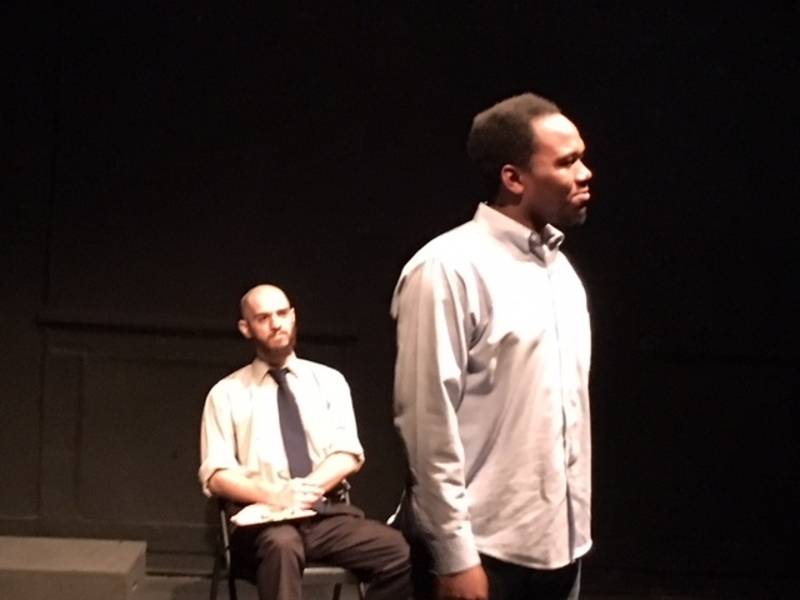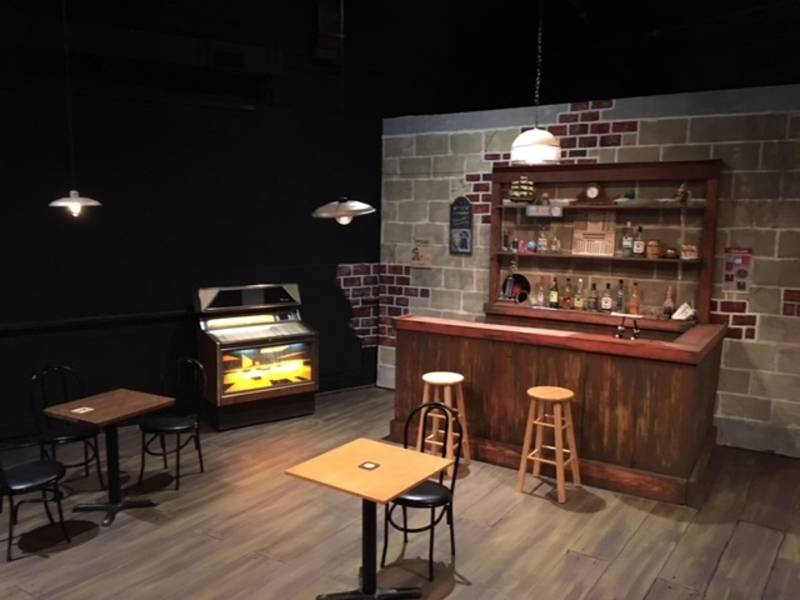The Station Theatre concludes its summer season this month with Sweat, a Pulitzer Prize winning play by Lynn Nottage. Set in Reading, Pennsylvania, it examines the struggles of a segment of society that we are hearing a lot about lately in the wake of the election of Donald Trump: the white working class. Yes, this is a group that has been the subject of a seemingly endless string of profiles in the New York Times and other prominent publications, yet this was conceived and written by Nottage before the election happened. She spent more than two years interviewing residents of Reading, and Sweat tackles those underlying issues of race and misdirected blame as they mingle with economic hardship and uncertainty faced by both black and white workers. Mathew Green is directing this production, and gave me some insight into the play, which debuts at the Station tonight.
Smile Politely: What’s your one sentence description of Sweat?
Mathew Green: Sweat is a play about what happens to people when their way of life gets upended and they alternately lose hope or go looking for someone to blame — or sometimes both.
SP: I did a little digging into the story of this play coming to the stage, and it seems that it was really a prophetic tale, in that it came out just before the 2016 election, yet hits on themes that we are now hearing over and over again in the national media: the economic struggles of the forgotten (white) working class and how that led to a Trump presidency. Can you speak to that a bit? How do you think current events might influence the audience’s experience?
Green: The play reflects the current political moment very astutely, I think. Workers falling victim to corporate greed, marginalized people looking for a better life. The fear of the Other. This all sounds pretty close to home. You get the sense, by the end of the play, that some of these folks might be persuaded by a person claiming he can make their lives “Great Again.” My hope is that the audience will recognize the humanity in the characters we’re presenting, whether or not they agree with those characters’ choices.
 SP: Are there storylines or themes that you feel C-U audiences in particular will be able to relate to?
SP: Are there storylines or themes that you feel C-U audiences in particular will be able to relate to?
Green: I imagine so. Financial uncertainty and uneasiness about the future are pretty relatable feelings for a lot of people right now. I think most people know what it’s like to live paycheck-to-paycheck. And I think it’s pretty common, especially now, to have a certain amount of apprehension — verging on dread — about where things might be headed, whether it’s globally or locally. I think most people reading this preview could imagine a rough road for themselves if they woke up tomorrow and their means of support was gone.
In Sweat we see the strain that this kind of uncertainty puts on friendships, marriages, and communities. We see how it changes people. I think it’s worth taking a second to wonder how it might change each of us.
SP: What drew you to this project?
Lynn Nottage was the main draw. She’s an extraordinary playwright, and I’m always drawn first and foremost to story. I have to find a story within a play that grabs me and won’t let go. In this case, in addition to a well-written story, I found the kind of story I most wanted to tell —which is to say a diverse story that speaks to more than one experience and needs a diverse group of actors to tell it well.
SP: Was there anything particularly challenging about bringing this material to life?
Green: It’s a very emotional story, but the actors have risen to the challenge of telling it honestly and with a lot of heart. The actors and designers involved in Sweat are exceptional, and their hard work shows. The hardest part of the process, for me, has been scheduling. It’s not a very sexy answer, but it’s true. Trying to organize and orchestrate anything as complicated as a play in the summertime is just damn difficult. The people who take on this challenge are already busy with jobs or families — and that’s before rehearsal starts. For them to put so much additional effort into creating a work of theatre like this one is really commendable.
SP: How do you first approach a script that you’re set to direct? What is the first day of rehearsal like?
Green: When I read a play, any play, I tend to stage it in my head. Even if I’m just reading for fun. I see the flow of movement and start to imagine in what sort of space the play occurs. The very first day of rehearsal is typically a reading of the play with the entire cast. But after that, I like to get a play on its feet. I’ll approximate the set and give actors a general sense of the movements. Then we just see what happens. There are always subtleties that can’t be discovered until you start living and breathing in the scenes.

SP: Can you tell us a bit about the actors in this production?
Green: I’m really grateful for this cast. And there’s a wonderful mix of experienced actors and newcomers. Chris Clevidence Taber, for instance, has been in several Station shows over the last eight seasons. At the other end of the spectrum, we have Evelyn Reynolds, Mindy Smith, and Matt Christman, each of whom are performing in their first Station show. Across the board, there’s so much talent in this show. I’m excited for audiences to see some familiar faces and discover some new ones.
You can make reservations for the show here. Online reservations must be made 24 hours in advance. For same day reservations, call (217) 384-4000 and leave a message. You should arrive at the theatre at least 10 minutes prior to the show.
Sweat
Station Theatre
223 N Broadway
Urbana
August 2-5, 8-11, 15-18 at 7:30 p.m.
August 12th, 3 p.m.
Photos provided by Mathew Green








